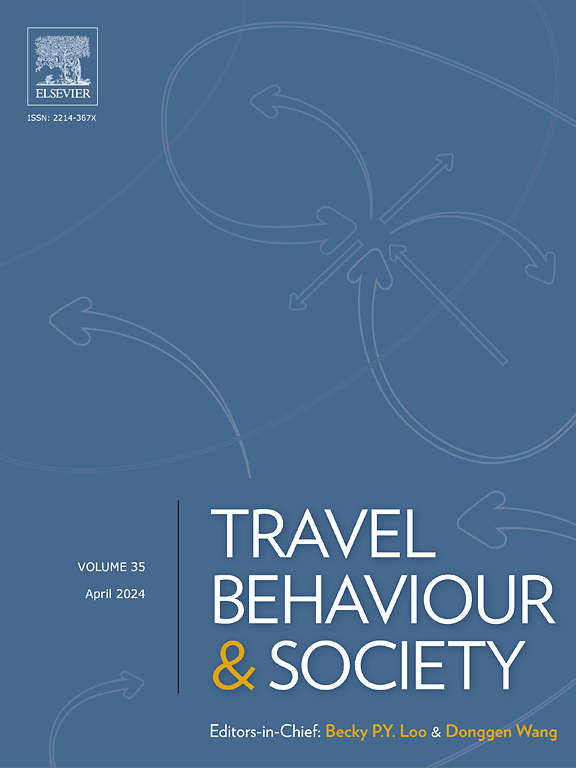Examining autonomous vehicle adoption: A media-based perception and adoption model
IF 5.7
2区 工程技术
Q1 TRANSPORTATION
引用次数: 0
Abstract
The primary goal of this study was to explore the factors that influence customers’ intentions to adopt autonomous vehicles (AVs). This research aimed to conceptualize behaviors related to AV adoption by utilizing the media-based perceptions and adoption model (MPAM) as a theoretical framework. 307 Malaysians with driver’s licenses and at least eighteen years old were the respondents of this study and data were statistically analyzed using PLS-SEM and fsQCA which are recognized as linear and non-linear approach respectively. The results from PLS-SEM indicate that social media (SM) has a positive impact on customers’ trust and subjective norms (SN). Trust subsequently affects perceived usefulness (PU), while subjective norms positively influence both perceived usefulness and perceived enjoyment (PEN) and negatively impact perceived risk (PR). Additionally, the findings confirm that the intention to adopt autonomous vehicles (IAV) is significantly influenced by perceived usefulness and enjoyment. However, there was no significant relationship between perceived risk and the intention to adopt autonomous vehicles. fsQCA, on the other hand, identified eleven combinations of conditions that effectively generate a high level of Autonomous Vehicles (AVs) adoption intention. Moreover, fsQCA uncovered two key antecedents perceived enjoyment and perceived usefulness which were found to be necessary conditions for the development of most combinations leading to a high level of AVs adoption intention. Hence, fsQCA complements PLS-SEM and provides deeper insights, thereby enhancing the accuracy of this study’s findings. Consequently, the results of this study are applicable to all stakeholders involved in policy formulation and implementation for AVs development in developing economies.
检验自动驾驶汽车的采用:基于媒体的感知和采用模型
本研究的主要目的是探讨影响消费者采用自动驾驶汽车意向的因素。本研究以基于媒体的感知与采纳模型(MPAM)为理论框架,对与AV采纳相关的行为进行概念化。307名持有驾照且年满18岁的马来西亚人是本研究的受访者,数据分别使用公认的线性和非线性方法PLS-SEM和fsQCA进行统计分析。PLS-SEM结果表明,社交媒体对顾客信任和主观规范有正向影响。信任随后影响感知有用性(PU),而主观规范对感知有用性和感知享受(PEN)均有正向影响,对感知风险(PR)有负向影响。此外,研究结果证实,采用自动驾驶汽车(IAV)的意愿受到感知有用性和乐趣的显著影响。然而,感知风险与采用自动驾驶汽车的意愿之间没有显著关系。另一方面,fsQCA确定了11种有效产生高水平自动驾驶汽车(AVs)采用意愿的条件组合。此外,fsQCA发现了感知享受和感知有用两个关键前因,这两个前因被发现是导致高水平自动驾驶汽车采用意愿的大多数组合发展的必要条件。因此,fsQCA补充了PLS-SEM,提供了更深入的见解,从而提高了本研究结果的准确性。因此,本研究的结果适用于发展中经济体中参与自动驾驶汽车发展政策制定和实施的所有利益相关者。
本文章由计算机程序翻译,如有差异,请以英文原文为准。
求助全文
约1分钟内获得全文
求助全文
来源期刊

Travel Behaviour and Society
TRANSPORTATION-
CiteScore
9.80
自引率
7.70%
发文量
109
期刊介绍:
Travel Behaviour and Society is an interdisciplinary journal publishing high-quality original papers which report leading edge research in theories, methodologies and applications concerning transportation issues and challenges which involve the social and spatial dimensions. In particular, it provides a discussion forum for major research in travel behaviour, transportation infrastructure, transportation and environmental issues, mobility and social sustainability, transportation geographic information systems (TGIS), transportation and quality of life, transportation data collection and analysis, etc.
 求助内容:
求助内容: 应助结果提醒方式:
应助结果提醒方式:


